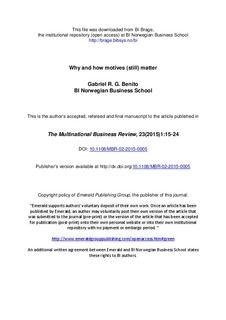Why and how motives (still) matter
Journal article, Peer reviewed
Permanent lenke
http://hdl.handle.net/11250/282528Utgivelsesdato
2015Metadata
Vis full innførselSamlinger
- Scientific articles [2181]
Sammendrag
Purpose – The article provides a discussion of the relevance of motives for companies’ internationalization.
Design/methodology/approach – Conceptual discussion building on established classifications of motives of internationalization, which distinguish between market-seeking, efficiency-seeking, resource-seeking and strategic asset-seeking motives.
Findings – The analysis demonstrates that important issues in companies’ internationalization differ systematically across different types of motives, which implicates that motives remain relevant when analyzing various aspects of the internationalization of the firm. Motives are also useful elements for theory building in international business.
Research limitations/implications – The analysis is purely conceptual and is not further substantiated by empirical evidence.
Practical implications – The classification of motives is a useful tool for companies to analyze their strategic alternatives and actions, especially with regard to performance measurement.
Social implications – A clear classification of the various motives for companies’ foreign activities is essential for formulation of sound policies about attraction/stimulation and regulation of companies’ inbound and outbound internationalization.
Originality/value – The article demonstrates the importance of retaining a clear classification of motives as a basis for further development of a theory of firms’ internationalization behavior.
Beskrivelse
This is the author’s accepted, refereed and final manuscript to the article
